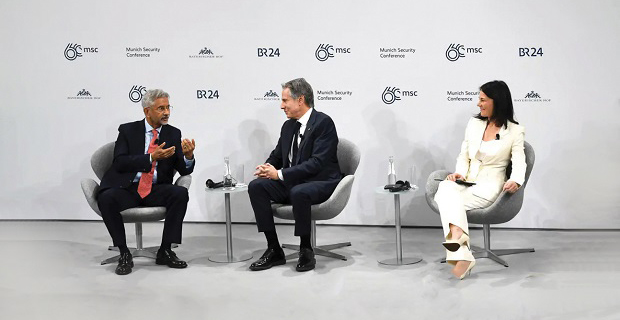MUNICH TESTS INDIA’S FOREIGN POLICY
The US is hopefully coming out of the flawed old policy of trying to create a balancing interface between Indo-US and US-Pakistan relationships. Pakistan has made the Pak-Afghan belt a home ground for Islamic radical forces and supported China’s ingress into Afghanistan through the latter’s Belt & Road Initiative (BRI). It had already allowed the China-Pak Economic Corridor (CPEC) to pass through the Northern Areas of POK against strong protest by India.
The Sino-Pak axis is influencing the current geopolitics in a major way and the American administration must take a call on this as a shared concern of India and the US. In the recent election in Pakistan, the Army came in the way of Imran Khan who had consistently condemned the US and who was compelled to fight the election from prison without availing of any party symbol.
This, however, should bring no comfort to America because in the uncertain political scene in Pakistan that prevailed through the polls, ‘radicalism’ in the Khyber Pakhtunkhwa-Afghanistan region did become stronger. Both the US and India realise that the Israel-Hamas conflict sparked off by the planned attack of radicalised Hamas on Israel on October 7, 2023, drew attention to a worrying new factor in the Middle East - the constant advance made by Islamic radical forces wedded to ‘faith-based’ terror, in the Muslim world.
The old ‘political’ dispute between Israel and Palestine is now overtaken by a confrontation driven by ‘religion and Jehad’ -- this should cause serious concern to the world at large. India under Prime Minister Modi has been exceptionally successful in countering this trend by pushing up economic development in West Asia to the top of the regional agenda and pitching on the “connectivity” of the Middle East with the rest of the world as a means of furthering that project.
Again, India’s initiatives in this regard rest on the fundamental policy of forging bilateral bonds for mutual security and economic benefits. As a consequence of this, there is now a dividing line between close US friends like Saudi Arabia and UAE with their approach of moderation towards Israel and the radical states like Yemen, Syria and Qatar who supported Hamas’ stand of refusing to recognise the very existence of the Israel state.
There is also a new level of Shia-Sunni conflict in West Asia because the fundamentalist regime of Ayatollahs in Iran with its total antipathy towards the US and Israel was actively encouraging its ‘proxies’ in the region to fight for Hamas and against Israel. India has done the right thing in denouncing the terror attack of Hamas on Israel and calling for caution on the part of Israel so that in its pursuit of Hamas, civilian casualties of the Palestinian population did not throw up a ‘human’ crisis. India also made it clear that it favoured the “two-state solution” in Palestine. India understands the US anxiety about the release of hostages captured by Hamas for using them as a “weapon” against Israel and hopes that with the mediation of a country like Egypt, a pause in the military drive of Israel would strengthen the prospect of the release of hostages.
India has joined hands with the US and Europe to launch the India-Middle East-Europe economic corridor to promote the cause of global economic growth and check the spread of Islamic radical forces in the region.
India has taken an independent-looking stand on the Middle East just as it had shown an upright response to the Ukraine-Russia military conflict, with Prime Minister Modi declaring at the beginning of that confrontation itself that “this is not an era of war” and calling for a cessation of hostilities in favour of talks for peace in which security concerns of both sides would be given due attention.
The stand of India has been understood by the world at large. At the Munich Security Conference, S. Jaishankar convincingly reiterated how India’s responses to the Ukraine-Russia and the Israel-Hamas conflicts best served the cause of global peace without letting the old political constructs of “alignment” come in the way.
For India, the priority was to constantly seek the betterment of its people through the pursuit of bilaterally useful economic benefits that did not hurt anybody else. Munich has helped -- because of the interventions of S. Jaishankar -- to project India’s foreign policy as the voice of sanity in today’s conflict-prone global scenario.
(The writer is a former Director of the Intelligence Bureau. Views are personal)











Comments.